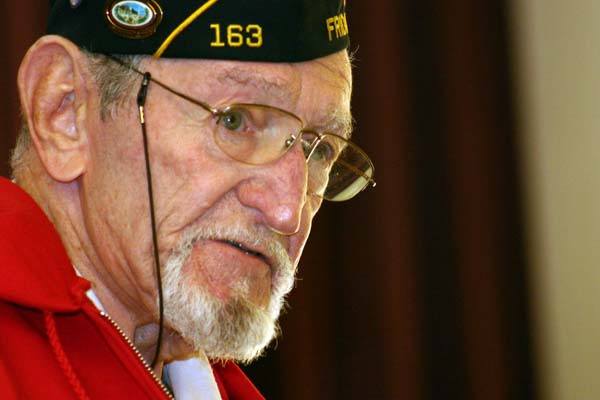Nov. 11 is Veterans Day, a federal holiday honoring America’s veterans.
On Nov. 10, Friday Harbor Middle School honored the island’s veterans. Journalist Howard Schonberger, a veteran of World War II and the Korean War, was guest speaker. Here are his comments:
* * *
In 1933, 77 years ago, there were no middle schools in Nebraska. It was the first of four terms for Franklin Delano Roosevelt, who had been elected president of the United States.
We were in a Great Depression, plagued by a drought. Seven of Omaha’s banks were closed and except for two who survived, depositors lost all of their savings. Unemployment was about 30 percent.
A war was surely coming and the first-ever peacetime draft was the next stop after high school graduation for boys. We had a regimental cadet corps at Central High. Over two dozen of my classmates graduating in those years were killed in World War II. Cadets had Springfield bolt-action rifles dating back to World War I. We had a regiment that dated back to the Civil War. Small wonder that we went into the Army in 1942. In basic training, we had the old Springfields (soon replaced by Garand clip-fed rifles after Pearl Harbor).
We no longer have a draft, thank goodness. Nonetheless, even though I lucked out in not getting clobbered during six years of active duty in the Army during wartime, I still always think to myself as I see the young men and women of our armed forces on the news and street: “THERE, BUT FOR THE GRACE OF GOD, GO I.”
The regulars in our armed forces, whether from Annapolis, West Point, or any of the other basic-training destinations they join, are our first line of defense and offense when trouble comes (like 9/11 or Pearl Harbor). Regulars were a small but vital portion of the 14 million in our U.S. armed forces between Pearl Harbor and the North Korean armistice.
I was trying to finish college when the call came in 1942. I have always been proud of the six years I served during WWII and Korea. Believe me, guys. You’ll find that some of these buddies are a lot smarter than you thought. Like when I discovered that the Bob Dole in my Infantry OCS Class back in 1944 at Fort Benning is now a former senator and great patriot, public servant, and peace negotiator. He and his wife Liddy, another high office holder in D.C. and North Carolina, were principals in meeting vets who take the honor flights to see the new World War II Memorial in Washington.
This honor was bestowed on me last spring on V-E Day, thanks to the American Legion Post 163 and its Auxiliary programs headed by Pauli Gavora and Minnie Knych. My greatest hope is that every World War II vet will make that trip to see the wonderful Marine Corps band, the Tomb of the Unknown Soldier, the Vietnam Veterans Memorial Wall and Korean War statuary and the Iwo Jima flag-raising statue, all tributes to our veterans’ service. There’s still a million or so left from WWII and only a few have made it from the West Coast.
One thing about you youngsters coming from Friday Harbor. This island’s greatest claim to fame is the fact that it is the home of the Pig War. The legislation that established our National Historical Park at American and English Camp designates that it was done not to commemorate a great battle, but rather to salute the victory by the PEACEFUL SETTLEMENT OF INTERNATIONAL DISPUTES.
Isn’t it strange that the Lt. George Pickett who established American Camp during the Pig War (over the shooting of a Hudson’s Bay Co. pig by an American settler) would appear later in history as major general leading Pickett’s Charge at Gettysburg on July 3. 1863? Almost a third of the troops (over 51,000) were lost: 28,000 by Pickett’s rebels and 23,000 of the Union Army. To Pickett’s credit, he opposed Lee’s plan, but fought bitterly to succeed. Thus Pickett’s charge was the bloodiest and Pickett’s Pig War the most bloodless in our military history.
Respect those vets, gang. Keep the peace … and as we sang during the war: “Bless ’em all, bless ’em all … the long and the short and the tall.” And God bless you.




